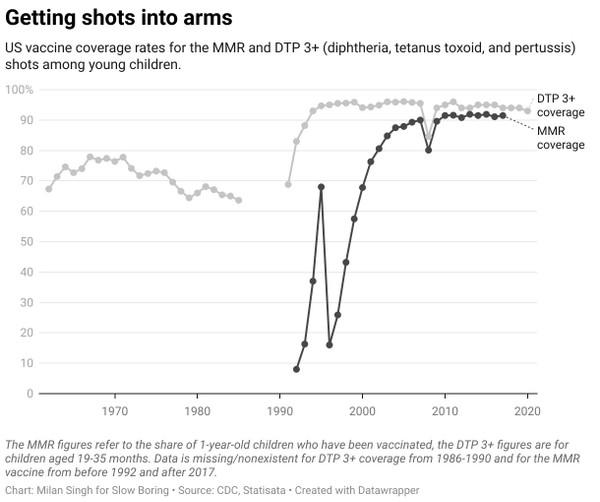The "misinformation problem" seems like misinformation
Curated from: slowboring.com
Ideas, facts & insights covering these topics:
9 ideas
·1.37K reads
5
Explore the World's Best Ideas
Join today and uncover 100+ curated journeys from 50+ topics. Unlock access to our mobile app with extensive features.
Misinformation and Propaganda
People are often misinformed about things. Sometimes they obtain that bad information from false or misleading media coverage; sometimes that media coverage is deliberately false. And there’s a fine line between media coverage that seeks to frame issues appropriately and coverage that’s propagandistic.
Propagandistic media coverage is bad, spreading false information deliberately or carelessly is bad, misleading people is bad, and it’s unfortunate that voters (and, frankly, elite policymakers) often make important decisions operating under misconceptions.
10
293 reads
The Internet Makes Us Better Informed
Accusing other people of being misinformed is easy since the stupidity of others will always be more evident than our own blind spots.
Thanks to the internet, now we can:
- Read many abstracts of new academic research, read some actual papers, and maintain a vast storehouse of links.
- Directly access think tank output on policy issues, as well as the running commentary from think tankers and university scholars on the issues that they study.
- Look up anything that we are curious about.
10
216 reads
People Getting More Aware
A survey from the Annenberg Public Policy Center found that in 2006, only 33 percent of people could correctly identify the three branches of government. By 2021, that was up to 56 percent. It’s also a powerful reminder that a huge share of the population doesn’t pay any attention at all to politics and government. A broader survey of political knowledge from the American National Election Survey shows no change in civic awareness except perhaps a small rise since the 1990s in knowledge of which party controls the majority in Congress.
10
122 reads
Facebook Really Is Bad For You!
If you give people a cash incentive to turn off their Facebook account, they spend more time watching TV but also more time socializing with friends and family. This leads to an increase in their subjective well-being (i.e., they’re happier) and generates “a large persistent reduction in post-experiment Facebook use.”
People struggle to go cold turkey. But once they do, they generally like it. So what about misinformation? It turns out that getting offline “reduced both factual news knowledge and political polarization.”
10
130 reads
Normal People Vs Crazy People
A normal person can tell you lots of factual information about his life, his work, his neighborhood, and his hobbies but very little about the FDA clinical trial process or the moon landing. But do you know who knows a ton about the moon landing? Crazy people who think it’s fake. They don’t have crank opinions because they are misinformed, they have tons and tons of moon-related factual information because they’re cranks.
11
136 reads
Anti-Vaccine Sentiment Isn’t New
A lot of people know that the licensing of the polio vaccine in the 1950s was widely greeted with celebratory headlines and the ringing of church bells. A lot of people also know that as part of a pro-vaccination effort led by the March of Dimes, Elvis Presley got vaccinated on camera for the Ed Sullivan show.
The announcement came on April 12, 1955, and Elvis went on TV in October of 1956. Eighteen months after authorization, vaccine uptake was still slow, and that was after a much longer development process.
11
105 reads
The Deeper Issue Of Trust: Expert Views Gone Wrong
There is fundamentally no way anyone could be unaware that the bulk of public health and medical professionals say the vaccines are safe and effective. The anti-vax stance isn’t misinformed about this reality; it simply asserts that public health and medical professionals are bad and you shouldn’t listen to them.
10
192 reads
Truth Is a Moving Target
Discerning the truth is hard, and it requires debate and dissent. Functional expert communities and well-run journalism institutions are open to new information, to changing their minds, and to correcting the record.
Our overall level of public health knowledge is improving rather than getting worse. People take the health risks of smoking much more seriously, and compliance with seatbelt rules is high even though practical enforcement is weak. Remember: Seatbelt mandates were very controversial when they were first introduced, taking years to be fully accepted.
10
90 reads
Information and Polarization
The thing that really has increased is polarization and the accompanying “everything is about everything” totalizing political conflict.
Polarization seems more likely a consequence of good information than bad. This creates a lot of very real problems for a political system that is not built to operate with highly organized, highly ideological political parties. But misinformation doesn’t seem to be a significant contributor to it. If anything, things are getting harder because information has gotten better.
10
87 reads
IDEAS CURATED BY
CURATOR'S NOTE
Things are getting worse because information has gotten better!
“
Karl Murphy's ideas are part of this journey:
Learn more about technologyandthefuture with this collection
How to create customer-centric strategies
The importance of empathy in customer success
The impact of customer success on business growth
Related collections
Similar ideas
4 ideas
How Our Brains Help Misinformation Go Viral
greatergood.berkeley.edu
5 ideas
3 reasons for information exhaustion – and what to do about it
theconversation.com
Read & Learn
20x Faster
without
deepstash
with
deepstash
with
deepstash
Personalized microlearning
—
100+ Learning Journeys
—
Access to 200,000+ ideas
—
Access to the mobile app
—
Unlimited idea saving
—
—
Unlimited history
—
—
Unlimited listening to ideas
—
—
Downloading & offline access
—
—
Supercharge your mind with one idea per day
Enter your email and spend 1 minute every day to learn something new.
I agree to receive email updates









